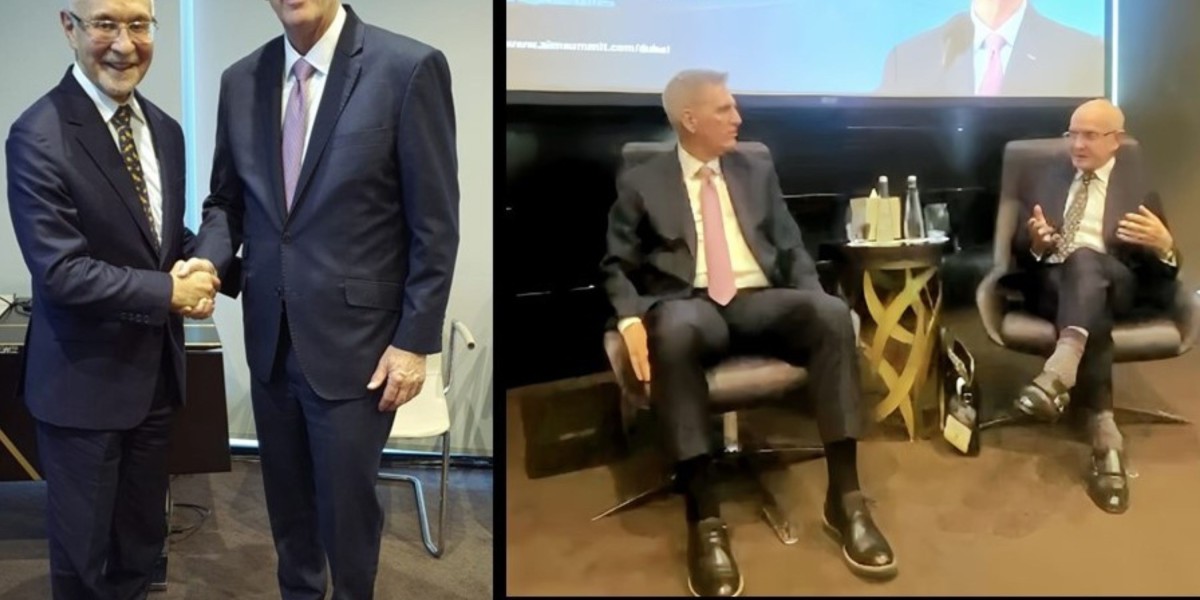Global economic uncertainty has reached new heights as sovereign debt concerns, political polarization, and financial instability dominate international discussions. At the AIM Summit in Dubai, former U.S. House Speaker Kevin McCarthy led a pivotal sovereign debt discussion with financial leaders, policymakers, and economists. His insights highlighted the challenges of the global sovereign debt crisis, the risks of political polarization in Western democracies, and the rise of emerging market trends amid global economic volatility.
This blog explores the key takeaways from McCarthy’s perspective and why his views carry significant weight for businesses, investors, and policymakers worldwide.
Kevin McCarthy’s Sovereign Debt Discussion at AIM Summit
The Kevin McCarthy sovereign debt discussion at AIM Summit offered a sharp analysis of the growing debt burden facing advanced and developing economies alike. McCarthy emphasized that global debt levels have escalated to historic highs, creating vulnerabilities in both established economies and emerging markets.
Governments worldwide are increasingly relying on debt financing, particularly after the pandemic stimulus packages. While this short-term response prevented deeper recessions, it left many economies heavily leveraged, increasing risks of defaults and financial crises.
Global Sovereign Debt Crisis Analysis
One of the strongest points raised during the session was a detailed global sovereign debt crisis analysis. According to McCarthy, rising interest rates, inflationary pressures, and slowing economic growth have created a precarious situation.
Countries with weaker financial structures are struggling to service their debt obligations. This is particularly visible in parts of Africa, South Asia, and Latin America, where rising borrowing costs are pushing economies toward potential insolvency. McCarthy warned that the ripple effect of defaults could destabilize the broader financial system.
Political Polarization in Western Democracies
Beyond the financial data, McCarthy connected economic fragility with political polarization in Western democracies. He explained that divisions within governments, especially in the U.S. and Europe, are making it difficult to pass sustainable fiscal policies.
Gridlock in legislative bodies often delays critical decisions on debt ceilings, spending reforms, and budget allocations. This political stalemate not only undermines investor confidence but also raises the risk of policy-driven crises.
McCarthy stressed that without bipartisan cooperation, managing sovereign debt will remain a recurring challenge for advanced economies.
Emerging Market Trends at AIM Summit
A major highlight of the AIM Summit was the focus on emerging market trends. Despite global volatility, emerging markets are demonstrating resilience and innovation. Regions like Southeast Asia, the Middle East, and Africa are leveraging technology, renewable energy, and infrastructure development to drive growth.
However, McCarthy also cautioned that these markets remain vulnerable to external shocks. Currency fluctuations, capital outflows, and reliance on foreign investment could destabilize growth trajectories if global interest rates remain high.
For investors, this presents both opportunities and risks — emphasizing the need for strategic, long-term approaches.
The Link Between Sovereign Debt and Economic Volatility
The global economy and financial volatility are deeply intertwined with sovereign debt. McCarthy explained that as governments issue more debt, financial markets become more sensitive to fiscal and monetary decisions. Even small policy missteps can trigger disproportionate market reactions.
For instance, U.S. interest rate hikes not only affect American borrowers but also increase the cost of debt servicing globally. Emerging markets, in particular, face the challenge of balancing debt sustainability with growth ambitions in an environment of rising borrowing costs.
Strategies for Addressing the Crisis
Kevin McCarthy’s perspective also included actionable strategies for addressing sovereign debt challenges:
Strengthening Fiscal Discipline – Governments must prioritize sustainable spending and reduce unnecessary borrowing.
Encouraging Bipartisan Cooperation – Particularly in the U.S. and Europe, political unity is essential to pass effective debt management policies.
Diversifying Economic Growth Drivers – Emerging markets should invest in innovation, digital transformation, and renewable energy to reduce reliance on debt.
Building Resilient Financial Systems – Strengthening banking sectors and increasing transparency in fiscal policies can enhance investor confidence.
Why Kevin McCarthy’s Insights Matter
The Kevin McCarthy sovereign debt discussion at AIM Summit was not just about economics; it was about leadership and foresight. His ability to connect fiscal policy with political realities and global market trends makes his analysis invaluable for businesses and policymakers alike.
With the global sovereign debt crisis analysis pointing toward heightened risks, and with emerging market trends offering both promise and peril, McCarthy’s message was clear: collaboration, innovation, and discipline are key to navigating global economic volatility.
Conclusion
The AIM Summit in Dubai highlighted critical issues shaping today’s world economy. Through Kevin McCarthy’s sovereign debt discussion, participants gained a comprehensive understanding of how sovereign debt, political polarization in Western democracies, and emerging market trends intersect with broader economic volatility.
For global leaders, the path forward lies in strategic debt management, bipartisan cooperation, and sustainable investment in emerging markets. As McCarthy emphasized, the choices made today will define economic stability for decades to come.








